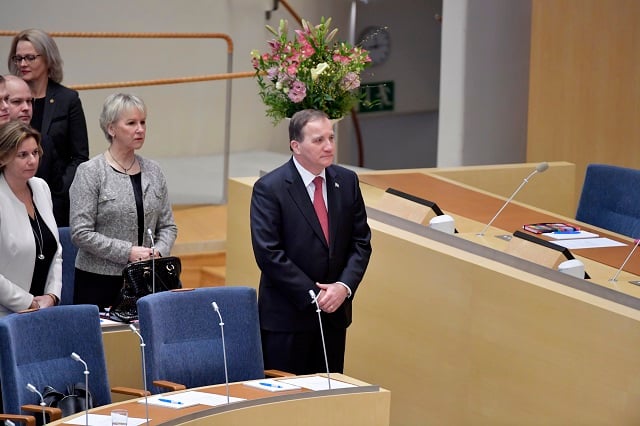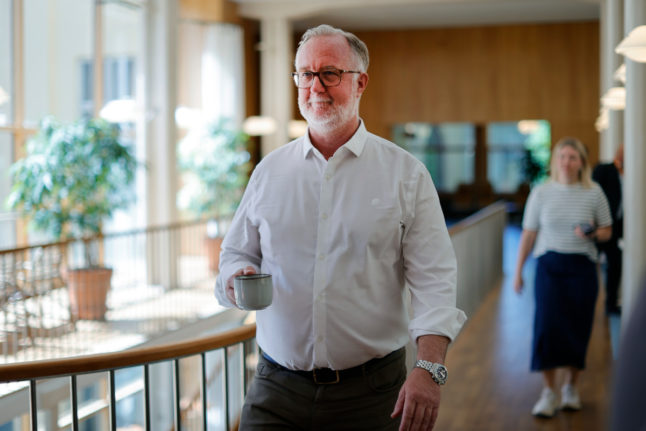In order to pass the vote, for which The Local was present at Sweden's parliament, Löfven required fewer than 175 of Sweden's 349 MPs to vote against him.
He received the backing of his party and the Green Party (115 MPs in total), while most MPs from the Centre Party, Liberal Party and Left Party (77 MPs) abstained from the vote, although one Centre Party MP voted 'no'. The Moderate Party, Christian Democrats and Sweden Democrats all voted against.
FOR MEMBERS: What does Sweden's government deal mean for internationals?
This result was expected after after parliamentary speaker Andreas Norlén formally nominated Löfven as prime minister two days earlier.
Löfven is set to announce the ministers in the new government on Monday.
Sweden’s parliament votes to re-elect Stefan Löfven as @SwedishPM. pic.twitter.com/eqNZSh3sxo
— Emma Löfgren (@ekjlofgren) January 18, 2019
Friday's vote was the third parliamentary vote on a prime minister candidate after the close election result left Sweden in political deadlock in September. There is no set time limit to form a government, but the number of prime ministerial votes that can be held is capped at four before a new election must be called.
Negotiations on forming a new government have taken longer than ever before in Sweden, and 131 days have now passed since the September election.
Speaker Andreas Norlén admits to being relieved the process is over. His calm, slightly geeky, manner has made him quite popular with Swedes in the past few months. pic.twitter.com/ZkheJccUtL
— Emma Löfgren (@ekjlofgren) January 18, 2019
The centre-left bloc won 144 seats (Social Democrats, Greens, Left), the centre-right bloc 143 seats (Moderates, Liberals, Centre, Christian Democrats), and the far-right Sweden Democrats 62 seats, leaving no bloc with an outright majority.
After Löfven lost an initial vote of confidence in parliament, the Moderates and Christian Democrats tried to form a government. However, this would have required accepting indirect support from the far-right Sweden Democrats, something the Centre and Liberal parties (part of a centre-right Alliance with the Moderates and Christian Democrats), refused to agree to.
But for a long time, they were unable to find enough common ground with the centre-left parties either. Löfven lost an earlier parliamentary vote after talks with the Centre and Liberals broke down.
TIMELINE: Everything that's happened in Swedish politics since the election
The deadlock was finally broken when the Social Democrats and Greens reached an agreement with the Centre and Liberal parties, who will allow the two former parties to govern in exchange for slightly more right-wing economic policies.
Moderate Party leader Ulf Kristersson criticizes his former centre-right Alliance colleagues for dealing with the Social Democrats. “We don’t outsource our policies to parties that have fought them.” pic.twitter.com/HdLh3ddQJb
— Emma Löfgren (@ekjlofgren) January 18, 2019
Löfven also won the reluctant support, in the form of abstentions, from Sweden's Left Party. Having worked with the previous Social Democrat-Green government on their budget, they are now excluded from many negotiations under the four-party deal. The party's leader said he wasn't happy with this agreement, but would allow Löfven to govern after allegedly being promised some influence in other areas and in order to avoid a right-wing government.
Left Party leader @jsjostedt says his MPs will abstain, but vows to move to topple Löfven if he puts forward proposals for deregulation of housing market and workers’ rights. pic.twitter.com/cG1PtlxrSI
— Emma Löfgren (@ekjlofgren) January 18, 2019
Speaking to reporters after the vote, Löfven described the four-party deal as “historic”.
In a world with growing far-right nationalism, he said, “Sweden chooses a different path”.
Explaining why he had chosen to make a deal with former rivals, Löfven added: “You have to decide. You either make compromises, or everyone stays stuck in their corner and we don't get a government.”
A few notable points from the deal include extending Sweden's temporary migration law for another two years, reintroducing a flight tax which was scrapped in the autumn budget, abolishing rent controls on newly built apartments, and introducing language and civics tests as a requirement for Swedish citizenship.
READ ALSO: Politics Q&A: What happens now and how did Sweden get here?

Speaker of parliament Andreas Norlén and Prime Minister Stefan Löfven. Photo: Lars Pehrson/SvD/TT



 Please whitelist us to continue reading.
Please whitelist us to continue reading.
Finally! Good news.